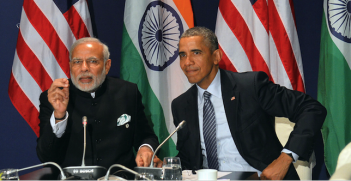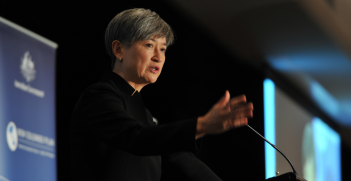ASEAN’s Agency in the Midst of Great Power Competition

There is always some agency even in the most seemingly dire of circumstances. Whether we have the wit to recognise it and the agility and courage to use it are entirely different matters.
Of late, observers have begun to question ASEAN’s agency, usually for all the wrong reasons. This happens periodically, and there is a tiresome repetitiveness in many of the criticisms. Having agency does not mean it will always be used wisely or correctly. But as I have too often had to point out, it is utterly useless to criticise a cow for being an imperfect horse.
There are some valid criticisms. First, some decision-makers and opinion-shapers in ASEAN member-states unfortunately take some critics far too seriously, and some take flattery far too seriously as well. In both cases this leads to a degradation of agency: action is perceived as either pointless or unnecessary. This is not trivial because a sense of fatalism can be fatal to small states, as fatal as a sense of complacency.
Being in the midst of great-power competition is not a novel experience for ASEAN. ASEAN was born amid Cold War major power competition, and on the mainland, the Cold War was far from cold. One of ASEAN’s fundamental purposes is to maximise the agency of its members to preserve national autonomy amid major power competition. The basic approach is to manage relations between members to minimise opportunities for external powers to take advantage of internal divisions to advance their interests. In short, enhanced regional cohesion allows members autonomy to pursue their own national interests rather than having them defined by external powers.
How it works in practice is neatly captured in an Indonesian slogan that has somehow fallen out of use: national resilience enhances regional resilience, and regional resilience enhances national resilience. It cannot be denied that this sense is weaker in some of the newer members than in the original members. Speaking about a year after the 2012 debacle in Phnom Penh where ASEAN for the first time failed to agree a Joint Communique because the then Cambodian Foreign Minister refused any compromise on the South China Sea (SCS), Hun Sen said supporting China was “Cambodia’s political choice.” This betrayed Cambodia’s lack of understanding of how ASEAN works. It is an inter-state and not supra-national organisation. No member is required to give up its sovereign right to define its national interests. Cambodia’s right to make its own political choices was never at issue. What was at issue was whether Cambodia had in any degree taken the regional interest into account when making that political choice.
One mistake ASEAN made was expansion without adequate socialisation of new members, but that is water under the bridge. It should not be forgotten that less that a week after the fiasco in Cambodia, thanks to the tireless efforts of former Indonesian Foreign Minister Marty Natalegawa, ASEAN did reach consensus on six principles that still form the fundamental basis of the ASEAN consensus on the SCS. It is a weak consensus, but nevertheless still a consensus, and an exercise of agency whose significance should neither be exaggerated nor down-played.
The present great power competition between the US and China is less immediately dangerous than the US-Soviet competition, but is more complex. It is less immediately dangerous because while the major powers, China in particular, are not without their proxies in ASEAN, the devastatingly destructive proxy conflicts that characterized Southeast Asia during the Cold War are today highly improbable. In fact, as during the Cold War, nuclear deterrence makes war by design between the principals highly improbable. The so-called Thucydides Trap, in which the US and China are “destined for war,” is a particularly foolish theory. Accidents could happen in the SCS, but if they do, they will not involve proxies because the likely proxies do not have the capability, and the principals will act quickly to contain the accident. Taiwan is another matter, but that is beyond the scope of this article.
This is not to say that those inclined to act as proxies cannot get into serious trouble. Cambodia and Laos are teetering precariously close to making a parallel mistake as that which led to very tragic results for their countries in the 1960s and 1970s. That mistake is to entrust what agency they have to an external power or trying to be passively neutral. Neutrality does not mean lying low and hoping for the best. True neutrality means knowing your own interests, taking positions based on your own interests and not allowing others to define your interests for you by default.
But not all is lost. Neither may care very much about the SCS, but they must care about control of the Mekong because that is an existential issue that directly affects the livelihood of their own peoples and ultimately regime survival. They have some difficult choices to make, and if they should make wrong choices, they will confront ASEAN as a whole with difficult choices. It may be necessary to cut loose the two to save the eight. That too would be an exercise of agency.
US-China competition is far more complex than US-Soviet competition ever was. This is one reason using the metaphor of a “new Cold War” is intellectually lazy and dangerously misleading. Such a conception distorts the essential nature of that relationship. This is an error that several ASEAN members have fallen into, limiting their strategic imagination. The US and the Soviet Union led competing systems, and their competition was over whose system would prevail. Now, the US and China are both vital components of a single system and compete within that system. The US and China compete while entangled in a web of supply chains of a scope, density, and complexity never before seen in the global economy and which certainly did not exist between the US and the Soviet Union. These supply chains distinguish the current type of interdependence from previous periods of interdependence and condition the nature of their competition.
This has created a more complex environment for all. During the Cold War, fundamental choices may have been very difficult, but they were essentially binary. The complex supply chains within which the US and China compete make their competition far from binary, though both sides would like to force binary choices. Some bifurcation in specific domains has already occurred, and more will occur as they try to mitigate their vulnerabilities. But the very complexity of the supply chains, especially in the technology domain, makes across-the-board decoupling of the US from China improbable – as improbable as China creating an entirely new alternative system or becoming totally self-reliant. If these are their goals, both will fail.
Complexity should not be paralyzing. In fact, complexity creates agency. In any situation, complexity broadens the range of choices because the course of events is never entirely predetermined. Actors depend on choices they and others make, which in turn further opens out the range of choices. This is what distinguishes the complex from the merely complicated.
As a strategic crossroads, Southeast Asia, and indeed the Indo-Pacific as a whole, is a naturally multipolar region. Multipolarity enhances agency because it maximises manoeuvre space. Southeast Asia is not and is very unlikely to ever be in a purely bipolar situation. Not all the poles will be of equal weight, but they do exist, and whether we realize it or not, ASEAN-created forums like the ARF, the EAS, and the ADMM Plus do help promote the natural multipolarity of the region by providing additional supplementary platforms to anchor major powers in the region. These are never going to be the sole or main platforms, but they are instruments that have been created and have the potential to become more useful and interesting anchors to partners. ASEAN has not been very creative in this respect, generally resting on its laurels and just doing more of what it has always done, or retreating into painfully detailed consideration of housekeeping matters, or making speeches at each other and pretending that they are strategic discussions. ASEAN has not optimally used the agency it processes.
Why is this so? In a word leadership. What has been described is not going to be easy. Agency depends on having the wit to recognise it, and the agility and courage to use it. Earlier generations of ASEAN leaders at all levels faced even more daunting situations and were able to deal with them. It is not that the present generation of ASEAN leaders is more dull-witted or timid than their predecessors. But they now operate within more complex and pluralistic domestic political environments, and this is true even of the one-party systems. It is harder to get domestic consensus, and without domestic consensus, there can be no regional consensus. This is not nostalgia for Southeast Asia’s non-democratic past, but merely a reminder that few things are wholly good or wholly bad and that leadership – and agency – begins at home.
Bilahari Kausikan is currently chairman of the Middle East Institute, an autonomous institute of the National University of Singapore. He has spent his entire career in the Ministry of Foreign Affairs. During his 37 years in the Ministry, he served in a variety of appointments at home and abroad, including as Ambassador to the Russian Federation, Permanent Representative to the UN in New York, and as the Permanent Secretary to the Ministry. Raffles Institution, the University of Singapore, and Columbia University in New York all attempted to educate him.
This article is adapted from a presentation given to ASEAN Roundtable 2020 on 23 October 2020.





